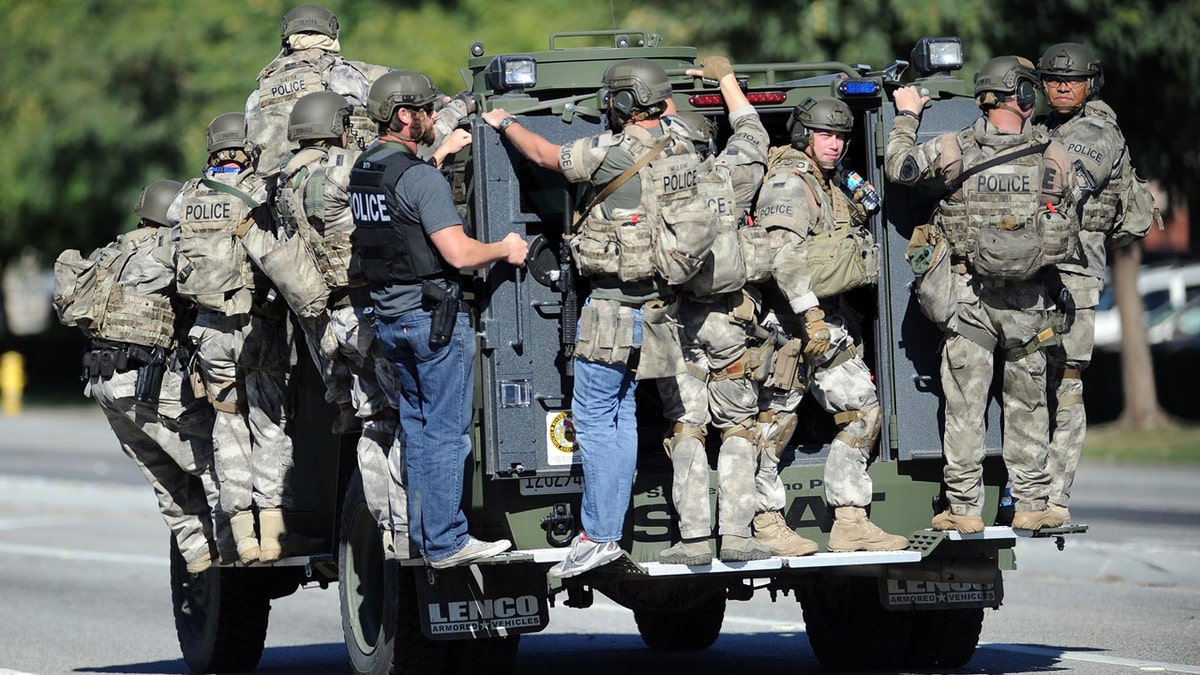
Dec. 2, 2015: An armored vehicle carries police officers near the scene of multiple shootings in San Bernardino, Calif. (Micah Escamilla/Los Angeles News Group via AP, File)
LOS ANGELES – As their colleagues were cut down by gunfire, three men rushed a shooter in an attempt to thwart the San Bernardino terror attack, according to an in-depth report of the massacre that provided new details Friday.
The three county employees were shot in the rampage by a colleague and his wife. The report did not say if any survived, though a federal prosecutor hailed their sacrifice.
"These victims had no chance to protect themselves as a result of the callous perpetration of violence, while others heroically sacrificed themselves in an attempt to stop the shooting," U.S. Attorney Eileen Decker said in a statement. "In the face of this unfathomable suffering, the law enforcement personnel and citizens who put themselves in harm's way to help others exemplifies the very best that our country has to offer."
The report by the Police Foundation, a policy study group, and the Department of Justice provided a detailed account of the pandemonium that unfolded as the Islamic extremists opened fire at a Dec. 2 meeting of the man's colleagues and, minutes later, as police first arrived at the scene of horrific bloodshed.
Syed Rizwan Farook and his wife, Tashfeen Malik, killed 14 people and wounded 22 others in the massacre at a training event and holiday gathering of the San Bernardino County Health Department, where Farook worked as a food inspector.
Farook had been present at the meeting but got up and left before returning a short time later clad in black, wearing a mask and armed with a semi-automatic rifle. His wife was also wearing black and toting an assault rifle.
The first victims had been shot outside the Inland Regional Center. One appeared to have been eating lunch at a picnic table and the other was found still holding his cellphone, according to the report based on interviews with over 200 witnesses, law enforcement officers and others.
Colleagues inside had heard popping sounds, but many didn't recognize the sound of gunfire until the doors burst open and they saw a man in black start spraying bullets. They didn't recognize him or his wife. People ran in horror, some dove to the floor and others fell from the fusillade.
Even then, some weren't sure what was happening, with one county official taking cover and thinking it was the "most glorified training I had ever seen."
"Probably on the second or third clip, it finally clicked that this wasn't an exercise," he said. The report provided confidentiality to witnesses, victims and first responders.
The couple calmly reloaded several times over the course of two to three minutes before they left, and appeared to look for signs victims might still be alive, shooting one or more bullets into those who made a sound or moved.
One injured woman asked a colleague "to call her mother and say goodbye for her," according to a draft of the report obtained by The Associated Press, but not included in the final version because of its graphic nature. The colleague tried to assure her she'd be OK, but the woman replied, "I'm not, I'm bleeding from the mouth" before closing her eyes for good.
The report, which was first written about by The New York Times, gives law enforcement high marks for their response, though it also points out areas of confusion or challenges law enforcement faced as they encountered the startling aftermath of the violence.
The carnage was described as looking "like a bomb had gone off." Smoke from gunpowder filled the room and water poured down from a fire sprinkler struck by gunfire.
"It was the worst thing imaginable," said a patrol officer who was one of the first four officers to enter the scene. "Some people were quiet, hiding, others were screaming or dying, grabbing at your legs because they wanted us to get them out, but our job at the moment was to keep going."
The officer regretted having to leave the casualties, but they thought the shooters were still in the building and had to first make sure it was safe.
A rookie officer took a report from one of the survivors, who said Farook had left the meeting early and that there was something about the shooter's body language that looked similar.
That led officers to Farook and Malik's apartment in nearby Redlands hours later. The two left in a rented black SUV and were trailed by several undercover officers. When a sergeant in a squad car joined in and tried to pull the couple over, his vehicle was hit by gun fire.
Farook then abruptly stopped and he and Malik began shooting at officers in the street, who took cover behind vehicles and returned fire.
The couple shot 81 bullets at police before being outgunned by two dozen officers who fired 440 rounds. One officer was shot in the leg and a deputy was grazed by a bullet.
Farook was struck 25 times, mostly in the legs. Malik was shot twice in the head, and had 13 other wounds.
Police found more than 2,000 rounds of ammo in the vehicle, along with first-aid equipment.
It wasn't all they left behind. Back at the conference room more than six hours after the attack, investigators found three pipe bombs in a bag Farook had left behind. The report said authorities now think they were intended to be detonated remotely when first responders aided the victims, but the remote detonating device didn't work.





















